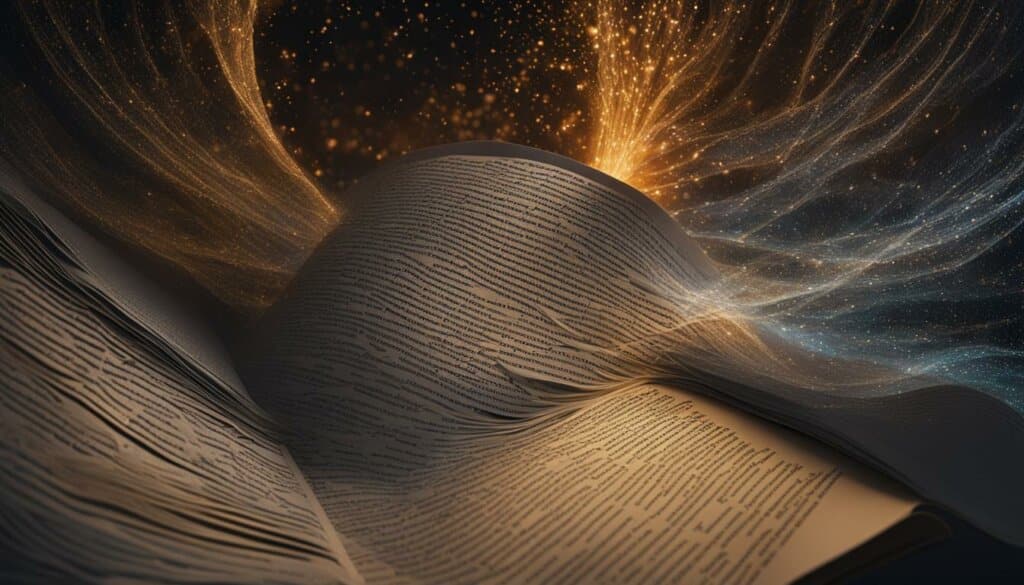Table of Contents
Discover how novelists are harnessing the power of ChatGPT and AI to revolutionize the art of novel writing. In this article, we will explore the ways in which ChatGPT is transforming the creative process for authors and unlocking new possibilities in storytelling.
AI has become an integral part of various industries, and the world of literature is no exception. ChatGPT, an advanced language model developed by OpenAI, is taking the writing world by storm. Its cutting-edge algorithms and deep understanding of language enable it to generate high-quality text that is virtually indistinguishable from that written by humans.
In the realm of novel writing, ChatGPT is redefining the boundaries of creativity and helping authors bring their stories to life. By leveraging the capabilities of ChatGPT, novelists are able to explore new ideas, overcome obstacles, and create compelling narratives that captivate readers.
In this article, we will delve into how novelists are utilizing ChatGPT in their creative processes. From generating story ideas and character descriptions to enhancing dialogue and even producing complete novels, ChatGPT is reshaping the way stories are conceptualized and written.
Join us as we unravel the impact of ChatGPT in the world of creative writing and uncover the potential it holds for authors seeking to elevate their craft. Whether you’re a seasoned novelist or an aspiring writer, this article will shed light on how AI is revolutionizing the art of storytelling.
Overview of ChatGPT and its Capabilities
ChatGPT, also known as Conversational Generative Pre-training Transformer, is a large language model developed by OpenAI. It utilises deep learning algorithms and is trained on a massive dataset of text to generate human-like writing. With its remarkable capabilities, ChatGPT has made a significant impact on the world of fiction writing, with authors across the globe embracing its technology to enhance their creative processes.
ChatGPT can generate a wide range of writing, from simple sentences to full-length novels, in various styles and formats. Its flexibility allows authors to explore new storytelling techniques and experiment with different narrative approaches. By fine-tuning the model, novelists can tailor ChatGPT to specific tasks such as generating story ideas, creating character descriptions, summarising complex plots, and even producing complete novels.
With ChatGPT, authors can tap into the power of AI to boost their creativity and expand their imagination. This technology has revolutionised the way stories are written, offering a collaborative and inspirational tool for authors to utilise in their craft. As the boundaries between human and machine creativity blur, authors are increasingly embracing ChatGPT to unlock new possibilities and push the limits of their storytelling abilities.
In the next section, we will delve deeper into how novelists are currently utilising ChatGPT in their creative writing processes, showcasing the real impact AI technology has had on the world of fiction.
Fiction Writing Capabilities of ChatGPT
| Capabilities | Description |
|---|---|
| Generate Story Ideas | ChatGPT can assist authors in generating unique and captivating story ideas, helping to overcome writer’s block and stimulate creativity. |
| Create Character Descriptions | Authors can rely on ChatGPT to generate vivid and detailed character descriptions, enriching the depth and complexity of their fictional worlds. |
| Summarize Plots | ChatGPT is capable of summarizing complex plots, helping authors maintain clear narrative structures and effectively communicate their storylines. |
| Generate Dialogue | Authors can utilize ChatGPT to generate authentic and engaging dialogue, elevating the quality of their character interactions and conversations. |
| Complete Novels | With its advanced language generation capabilities, ChatGPT can even assist in generating complete novels, offering a starting point for authors to expand upon and refine. |
Current Use of ChatGPT in Creative Writing
Many novelists are currently using ChatGPT as a writing tool to assist them in various aspects of their creative process. ChatGPT serves as a writing prompt generator, helping authors generate story ideas and overcome writer’s block. It is also used as a writing collaborator, generating dialogue, descriptive passages, and entire scenes for authors to work with. Some novelists have even used ChatGPT to create poetry, song lyrics, and screenplays. This AI-powered tool is transforming the way novelists write and collaborate with AI technology.
Writing Prompt Generator
ChatGPT excels as a writing prompt generator, providing novelists with a constant stream of inspiring ideas. Authors can input a few keywords or a general theme, and ChatGPT will generate a range of story concepts to spark their creativity. This feature has proven invaluable for writers struggling with writer’s block or simply seeking fresh ideas for their next piece.
Writing Collaborator
Authors are also collaborating with ChatGPT to enhance their writing process. ChatGPT can generate dialogue for characters, descriptive passages for settings, and even entire scenes for authors to build upon. This collaborative approach allows writers to leverage the AI’s creativity while maintaining their unique voice and storytelling style.
By working alongside ChatGPT, novelists can tap into its vast knowledge and generate content that they may not have considered otherwise. It’s like having a co-writer who is always ready with ideas and suggestions, pushing the boundaries of what is possible in storytelling.
Expanding Creative Horizons
Novelists have discovered that ChatGPT is not limited to traditional prose. Some have experimented with using the tool to create poetry, song lyrics, and even screenplays. The AI’s ability to generate imaginative and evocative language opens up new possibilities for creative expression across various forms of writing.
Overall, the collaboration between novelists and ChatGPT is transforming the way stories are written and revolutionizing the creative writing process. Writers experience enhanced inspiration, creativity, and the ability to explore new avenues of storytelling, thanks to this powerful AI-powered tool.

Potential Future Applications of ChatGPT in Creative Writing
The potential for ChatGPT in creative writing is vast. As technology continues to advance, ChatGPT could play a crucial role in enhancing storytelling and revolutionizing the creation of novels.
Personalized Writing Prompts and Exercises
In the future, ChatGPT has the potential to generate personalized writing prompts and exercises tailored to a writer’s unique style and strengths. By analyzing a writer’s past work and understanding their preferences, ChatGPT can provide targeted prompts that inspire creativity and help overcome writer’s block. These tailored exercises can assist writers in exploring new ideas and refining their craft.
Editing and Revising Assistance
ChatGPT can also be used as an invaluable tool for editing and revising manuscripts. By analyzing the structure, coherence, and impact of the text, ChatGPT can offer insightful suggestions to enhance the overall quality of the work. It can provide recommendations for improving sentence construction, grammar, and clarity, ultimately helping authors refine their storytelling and make their novels more engaging.
Generating Multilingual Literature
With its language capabilities, ChatGPT has the potential to generate multilingual literature, breaking down language barriers and opening up new opportunities for authors to reach a global audience. Writers can tap into the power of ChatGPT to create stories in multiple languages, expanding the potential impact of their work and fostering cultural exchange.
Creating Interactive Fiction
ChatGPT can be used to create interactive fiction, immersing readers in dynamic and engaging storytelling experiences. With its ability to generate responsive and context-aware text, ChatGPT can bring characters to life and enable readers to interact with the story world. This interactive element adds a new dimension to the reading experience, making it more immersive and captivating.
Serving as a Virtual Writing Assistant in Real-Time
In the future, ChatGPT could serve as a virtual writing assistant, offering real-time support and guidance to authors as they write. Writers can collaborate with ChatGPT, receiving instant suggestions for plot development, refining dialogue, and exploring alternative narrative paths. This AI-powered virtual assistant can be an invaluable resource, helping authors overcome creative challenges and facilitating the writing process.
The potential future applications of ChatGPT in creative writing are exciting. From personalized prompts to multilingual literature, AI-powered novel creation, and immersive interactive fiction, ChatGPT has the ability to transform the way stories are told. As technology evolves, authors have the opportunity to embrace ChatGPT’s capabilities and explore new horizons in their creative endeavors.
How ChatGPT Can Assist Writers in Improving Their Craft
ChatGPT, with its AI-powered capabilities, can be a valuable tool for writers looking to enhance their craft and take their work to new heights. By providing feedback and suggestions, ChatGPT revolutionizes the process of authorship, transforming it into a collaborative experience between humans and AI.
Improving Writing Skills
One of the key ways ChatGPT assists writers is by providing feedback on their writing. It can analyze grammar, sentence structure, and overall coherence, helping writers identify areas for improvement. With ChatGPT’s insights, writers can refine their writing skills and deliver more compelling and polished content.
Developing Writing Style and Voice
ChatGPT goes beyond basic feedback by helping writers develop their unique writing style and voice. By analyzing a writer’s past work, ChatGPT can understand their preferences and strengths. It then offers tailor-made suggestions and prompts that align with the writer’s individuality, empowering them to further refine their style and voice.
Enhancing Vocabulary and Grammar
Another way ChatGPT helps writers is by expanding their vocabulary and grammar. It suggests new words and phrases that writers can incorporate into their writing, adding depth and complexity to their work. By expanding their linguistic range, writers can captivate readers with rich and diverse language, enhancing the overall impact of their writing.
“ChatGPT provides writers with valuable insights and guidance to enhance their craft. It assists in refining writing skills, developing unique writing styles, and expanding vocabulary and grammar.”
Enabling Creative Exploration
ChatGPT’s AI-powered novel creation capabilities open up new horizons for writers. It enables them to explore uncharted territories and experiment with different narrative styles, genres, and characters. By collaborating with ChatGPT, writers can unleash their creativity and uncover unique storylines that captivate readers and push the boundaries of storytelling.
Boosting Productivity and Efficiency
With ChatGPT’s support, writers can save time and enhance their productivity. It can generate ideas, provide inspiration, and offer alternative perspectives, fueling the creative process. By streamlining tasks like idea generation and initial drafts, ChatGPT enables writers to focus on higher-level aspects of storytelling, increasing efficiency and output.
In conclusion, ChatGPT is transforming the landscape of authorship by providing writers with valuable insights, guidance, and a collaborative environment. From improving writing skills to unlocking creative potential, ChatGPT revolutionizes the way writers approach their craft. By embracing this AI-powered tool, writers can enhance their skills, write more engaging stories, and revolutionize the world of literature.
Ethical Considerations Surrounding the Use of AI in Creative Writing
The use of AI in creative writing raises ethical considerations that need to be examined. One of the main concerns is the question of authorship, as AI-generated writing blurs the lines between human and machine creativity. With AI’s ability to produce highly coherent and compelling text, there is a growing debate about whether AI can be considered a true author.
Another ethical consideration is the potential for AI to replace human writers. While AI can improve efficiency and productivity, there is a concern that widespread adoption of AI in writing could lead to job losses and a loss of unique perspectives in literature. It is essential to strike a balance between AI’s capabilities and preserving the human element in storytelling.
Furthermore, there is a concern that AI-generated writing may lack emotional depth and perpetuate biases and stereotypes present in the training data. AI models learn from existing text, which means they can inadvertently reproduce and amplify existing social biases. It is crucial to address the potential biases in AI-generated writing and strive for fairness, inclusivity, and representation in AI systems.
As AI continues to shape the future of creative writing, these ethical considerations need to be carefully navigated. Responsible use of AI in writing requires transparent algorithms, diverse training data, and ongoing evaluation to mitigate potential biases and ensure the value and integrity of creative works.
Ethical Considerations in AI-generated Writing
| Ethical Considerations | Implications |
|---|---|
| Question of authorship | Blurring the lines between human and machine creativity |
| Potential job losses | Impact on human writers and unique perspectives in literature |
| Biases and stereotypes | Reproduction and amplification of biases present in training data |
| Fairness and inclusivity | Mitigating biases and ensuring a diverse representation in AI-generated writing |
Conclusion
ChatGPT has emerged as an indispensable tool for novelists, providing them with a new level of creative potential and transforming the way stories are crafted. By harnessing the power of AI technology, novelists can enhance their creativity and improve their writing skills, enabling them to explore uncharted territories in their storytelling.
While there are ethical considerations surrounding the use of AI in creative writing, the impact of AI in the writing process cannot be overlooked. ChatGPT and other AI technologies offer novelists a gateway to unprecedented possibilities, allowing them to push the boundaries of their own writing and revolutionize the way stories are told.
As novelists embrace the capabilities of ChatGPT and AI, they have the opportunity to unlock their full creative potential. By integrating AI into their writing processes, authors can improve their storytelling, expand their horizons, and captivate audiences in new and exciting ways. The future of novel writing with AI is promising, and it is up to writers to harness this technology and shape the future of literature.
FAQ
How are novelists using ChatGPT in their writing?
Novelists are using ChatGPT to generate story ideas, overcome writer’s block, collaborate on dialogue and scene creation, and even create poetry, song lyrics, and screenplays.
What is ChatGPT’s role in modern novel writing practices?
ChatGPT offers novelists a valuable tool to enhance their creativity, improve their writing skills, and explore new possibilities in storytelling.
What are the potential future applications of ChatGPT in creative writing?
In the future, ChatGPT could be used to generate personalized writing prompts, assist with editing and revising manuscripts, generate multilingual literature, and serve as a virtual writing assistant in real-time.
How can ChatGPT assist writers in improving their craft?
ChatGPT can provide feedback on writing, help develop a writer’s style and voice, expand vocabulary and grammar, and offer suggestions and prompts tailored to a writer’s unique strengths.
What are the ethical considerations surrounding the use of AI in creative writing?
Some ethical considerations include questions of authorship, concerns about job losses and a loss of unique perspectives in literature, and the potential for AI-generated writing to lack emotional depth and perpetuate biases.













